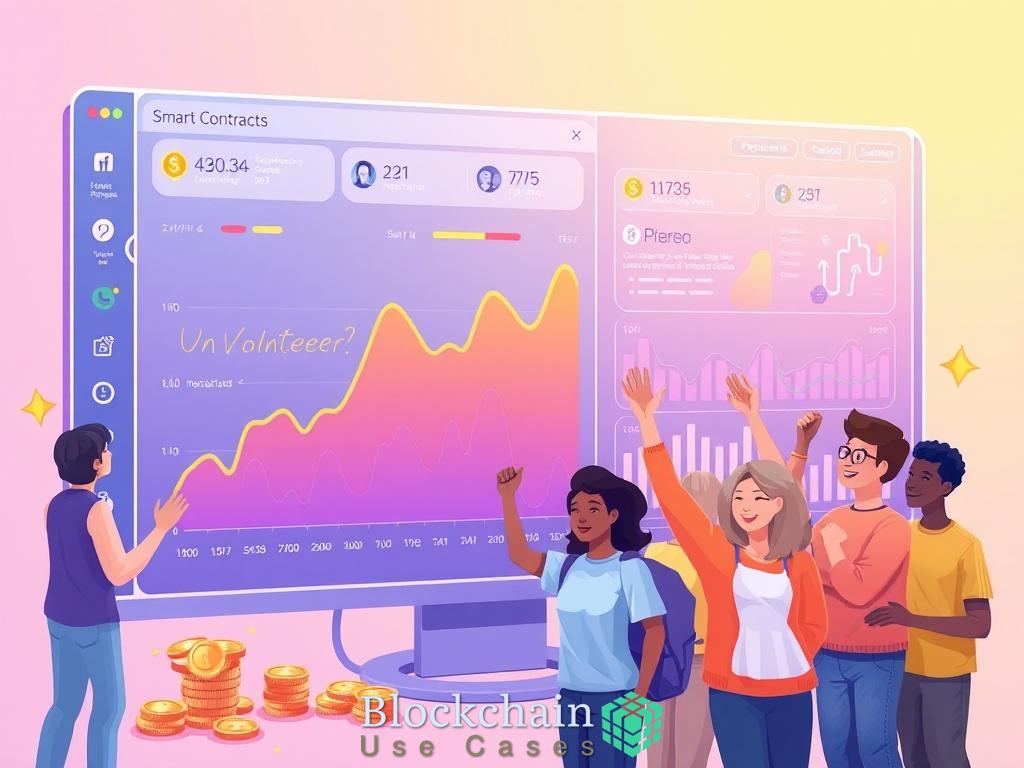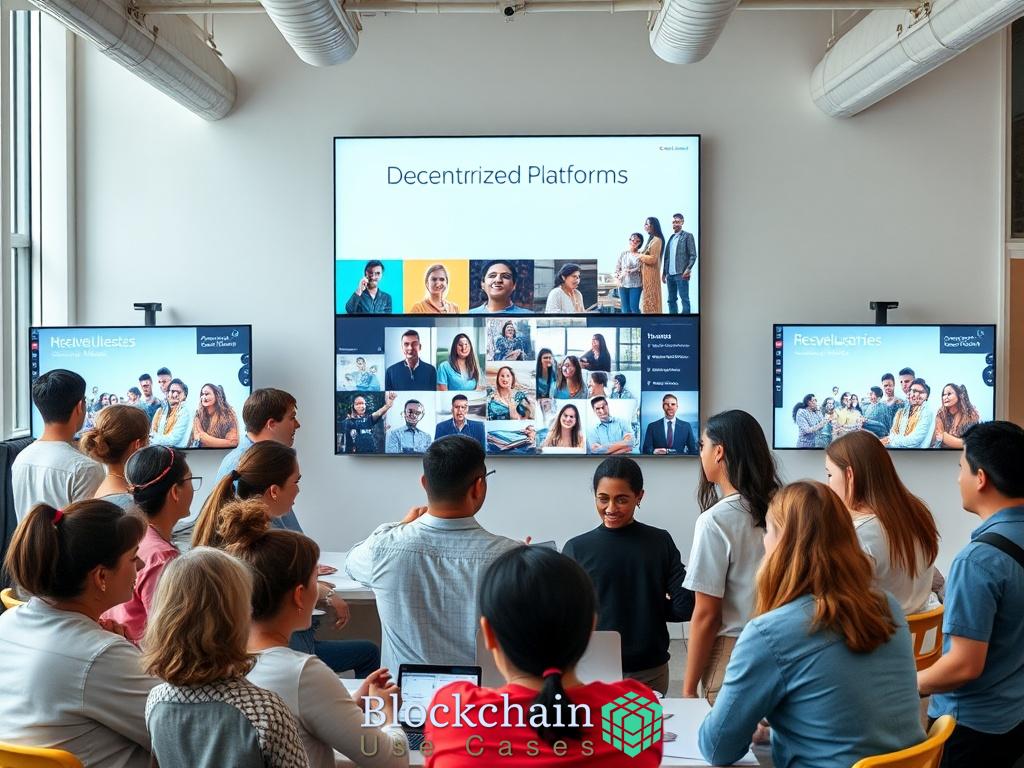Revolutionizing Volunteer Recognition with Blockchain
In a world where volunteer efforts often go unnoticed and unappreciated, the advent of blockchain technology presents a groundbreaking solution. By integrating decentralized platforms into volunteer recognition programs, organizations can ensure that every hour of service is accurately tracked, rewarded, and celebrated.
Blockchain technology offers a transparent and immutable ledger, which is essential for building trust in volunteer recognition systems. Imagine a platform where volunteers can earn tokens or badges that represent their contributions, which can later be exchanged for tangible rewards or privileges. This not only motivates volunteers but also creates a sense of community and belonging.
Decentralizing volunteer recognition brings numerous advantages, including enhanced transparency, increased engagement, and the ability to reward volunteers in innovative ways. Below is an overview of the benefits:
- Transparency: All contributions are recorded on a public ledger, ensuring accountability.
- Incentivization: Volunteers can earn digital tokens, which can be redeemed for various rewards.
- Community Building: A decentralized platform fosters a sense of belonging among volunteers as they can see their impact.
While the benefits are significant, implementing a blockchain-based recognition system comes with challenges. Organizations must consider factors such as technology adoption, user education, and initial investment. However, the long-term rewards far outweigh the initial hurdles.
Smart Contracts: Automating Rewards for Volunteers

Imagine a world where volunteer incentives are not just promises but are guaranteed by technology. Smart contracts, a fundamental feature of blockchain, offer this transformative capability. These self-executing contracts allow organizations to set predefined conditions for rewards, which are automatically fulfilled once the criteria are met. This not only ensures efficiency but also instills a profound sense of trust among volunteers, knowing that their efforts will be rewarded transparently.
The Mechanism Behind Smart Contracts operates seamlessly within a decentralized ecosystem. When a volunteer completes a task, the smart contract verifies the completion against its predetermined conditions. For instance, if a volunteer logs a minimum of ten hours in a community service project, the smart contract triggers the issuance of digital tokens as a reward. This automation reduces administrative burden and minimizes the potential for discrepancies, ensuring that all volunteers receive recognition for their contributions without delay.
Benefits of Automated Rewards extend beyond mere convenience. By integrating smart contracts into volunteer programs, organizations can foster a culture of engagement and accountability. Volunteers are more likely to participate when they know their contributions will be promptly acknowledged. Additionally, the real-time tracking of volunteer hours through these contracts creates a detailed history of contributions, which can be invaluable for both personal growth and organizational planning.
Challenges and Solutions are also a part of this innovative approach. While the technology holds immense promise, organizations may face hurdles such as understanding the complexities of smart contracts or overcoming resistance to change. To navigate these challenges, it is crucial to provide comprehensive training and resources for both organizations and volunteers. By demystifying the technology and showcasing its benefits, organizations can encourage widespread adoption and harness the full potential of decentralized reward systems.
Building Community Trust through Decentralization

In an increasingly interconnected world, the quest for building a trustworthy community becomes paramount, especially within volunteer programs. A decentralized platform not only democratizes the recognition process but also lays the groundwork for a more credible and inclusive environment. By shifting away from traditional, centralized systems, organizations can create an atmosphere where every contribution is valued and celebrated, fueling a cycle of positivity and engagement.
Embracing Transparency as a Foundation
At the heart of decentralization lies transparency, a cornerstone for fostering trust within a community. When volunteer contributions are logged on a public ledger, it ensures that every action is visible and verifiable. This level of openness eliminates doubts regarding the accuracy of recognition and reward distribution. Volunteers can see their impact reflected in real-time, reinforcing their commitment to the cause. Furthermore, organizations can benefit from this transparency by showcasing their accountability, enhancing their reputation among stakeholders and potential volunteers alike.
Empowering Volunteers Through Participation
Decentralized platforms empower volunteers by giving them a stake in the recognition process. Unlike conventional systems where decisions are often made behind closed doors, decentralized models encourage volunteer feedback and participation in shaping reward criteria and recognition methods. This participatory approach not only fosters a deeper sense of community but also ensures that the system evolves in a way that meets the needs and preferences of its members. As volunteers contribute their insights, they are more likely to feel valued and invested in the program, cultivating a vibrant and engaged community.
| Feature | Centralized System | Decentralized System |
|---|---|---|
| Transparency | Limited visibility of contributions | Public ledger ensures full visibility |
| Volunteer Engagement | Minimal input in decision-making | Active participation in recognition processes |
| Trustworthiness | Dependent on a single authority | Distributed trust across community members |
Building Lasting Relationships
Ultimately, the establishment of trust through decentralization leads to stronger and more enduring relationships within the volunteer community. By recognizing every individual’s contribution with fairness and transparency, organizations can cultivate loyalty and a sense of belonging. Volunteers who feel appreciated are more likely to return and bring others along, thus expanding the community and enhancing its overall impact. As organizations embrace decentralized recognition systems, they not only enhance their credibility but also enrich the community fabric, paving the way for future collaborations and initiatives.
Engagement Metrics: Measuring Volunteer Impact
In the realm of volunteerism, understanding the impact of individual contributions is crucial for fostering motivation and commitment. As organizations increasingly adopt decentralized platforms, the need for effective engagement metrics becomes paramount. These metrics not only quantify volunteer efforts but also provide insights that can drive program improvements and enhance the overall volunteer experience.
Defining Engagement Metrics involves identifying key performance indicators (KPIs) that reflect the value of volunteer activities. Rather than merely counting hours logged, these metrics encompass various dimensions, such as the quality of service provided, volunteer retention rates, and the breadth of community impact. By employing a comprehensive approach to measuring volunteer impact, organizations can better appreciate the diverse contributions made by their members, ultimately leading to a more engaged and motivated volunteer base.
The integration of technology within decentralized platforms creates opportunities for sophisticated data collection and analysis. With the assistance of blockchain, organizations can track not only the time volunteers spend on tasks but also the specific outcomes of their efforts. For instance, a volunteer’s involvement in a community project may lead to measurable benefits, such as increased community engagement or improved access to resources. Capturing these outcomes through smart contracts ensures that the data remains transparent and immutable, providing a reliable foundation for evaluating volunteer impact.
Moreover, leveraging social media and community feedback mechanisms can further enrich engagement metrics. Volunteers can share their experiences and insights, enabling organizations to gather qualitative data that complements quantitative measures. This holistic view of volunteer contributions not only strengthens the connection between volunteers and organizations but also empowers volunteers to feel more invested in their roles.
Establishing a robust feedback loop is essential for maximizing volunteer engagement and impact. Decentralized platforms allow for real-time feedback collection, enabling organizations to assess volunteer satisfaction and areas for improvement promptly. By actively seeking feedback, organizations can adapt their recognition programs to better meet volunteers’ needs, ensuring that they feel valued and acknowledged.
Furthermore, these platforms can facilitate peer recognition, where volunteers can acknowledge each other’s contributions. This peer-to-peer acknowledgment fosters a sense of community and reinforces the value of collaboration. When volunteers see their efforts recognized by their peers, it cultivates a culture of appreciation that can significantly enhance motivation and engagement.
| Engagement Metric | Description | Impact on Program |
|---|---|---|
| Volunteer Retention Rate | Percentage of volunteers who continue to engage over time | Indicates program satisfaction and effectiveness |
| Community Impact Score | Measures the tangible outcomes of volunteer activities | Demonstrates the value of contributions to the community |
| Peer Recognition Frequency | Frequency of acknowledgment among volunteers | Enhances community feeling and motivation |
In summary, the importance of engagement metrics cannot be overstated in the context of decentralized volunteer programs. By embracing technology and fostering a culture of feedback and recognition, organizations can not only measure volunteer impact more effectively but also create an environment where volunteers feel empowered, appreciated, and inspired to continue making a difference.
Tokenomics: Incentivizing Volunteer Participation
In the ever-evolving landscape of volunteer programs, tokenomics stands out as a revolutionary approach to incentivizing participation and fostering a vibrant community. By integrating tokens into decentralized platforms, organizations can create a dynamic ecosystem where every contribution is not only recognized but also rewarded in innovative ways. This approach transforms volunteerism from a purely altruistic endeavor into an engaging, mutually beneficial experience, encouraging greater involvement and sustained commitment.
The essence of tokenomics lies in its ability to align incentives with volunteer actions. Unlike traditional recognition systems that often rely on mere acknowledgment, tokenomics introduces a tangible value for contributions, creating a win-win scenario for both volunteers and organizations. Volunteers earn tokens for their service, which can be redeemed for various rewards, from exclusive experiences to essential resources. This system not only enhances motivation but also deepens the sense of community as volunteers can see their contributions reflected in real-time.
Consider a volunteer who dedicates time to a local project. In a tokenized system, their hours translate directly into tokens, which can be tracked on a decentralized ledger. The transparency of this process ensures that volunteers feel appreciated and valued. Furthermore, as tokens accumulate, volunteers can participate in governance decisions, shaping the future of the programs they support. This participatory element fosters a sense of ownership and belonging, driving further engagement.
Tokenomics is not just about rewarding individual volunteers; it’s also about amplifying the broader community impact. By creating a structured reward system, organizations can encourage collaborative projects that require teamwork and collective effort. When volunteers see their tokens contributing to community goals, their motivation to participate increases exponentially. Moreover, organizations can leverage data from token transactions to assess engagement trends and identify areas for improvement.
Here’s a breakdown of how tokenomics can enhance volunteer programs:
| Aspect | Traditional System | Tokenized System |
|---|---|---|
| Incentives | Recognition and certificates | Earned tokens for participation |
| Engagement | Minimal feedback | Real-time tracking and rewards |
| Community Building | Limited interaction | Collective goals and governance |
In conclusion, embracing tokenomics within decentralized platforms for volunteer management not only revitalizes engagement but also creates a more rewarding experience for all participants. By recognizing and incentivizing volunteer contributions through a structured token system, organizations can cultivate a thriving ecosystem where every effort counts, ultimately leading to profound community impacts.





